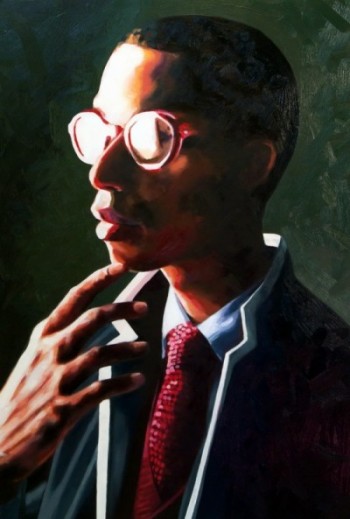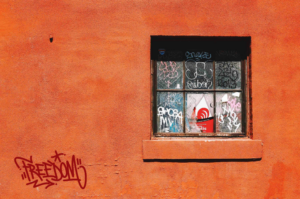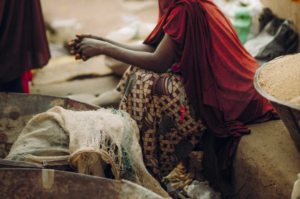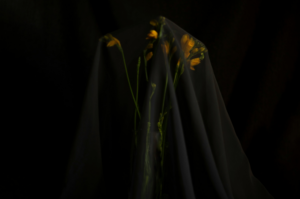Jowi is on his way to Huruma to visit a sister mourning the death of her husband. On his walk to her house, he reflects on slum life in Nairobi and weaves these reflections into a reminiscences of old family quarrels. Magunga Williams writing is a little raw and edgy and makes for an exciting read.
Enjoy!
“I used to live in Block C, door 5,” his mother used to tell him every time they walked past that flat. “It was given to me by the government back when I worked as a secretary in the Ministry of Public Works.”
Jowi knew this story by heart, but she always felt the need to prompt him for the script. Back then his mother used to stay with her boyfriend in that flat—some lazy hippie who couldn’t think past his flared-trousers and afro.
His name was Nelson Constantine Cornelius Mandela Apondi—a Luo from south of the lake. The side Jowi’s mother called Loka. Such a redonkulous name, staggering under the weight of a mouthful of English names, could only belong to a Luo, from Loka.
“Nelson was a long lilo,” his mother was fond of saying. Ordinarily, that would mean that he was impotent, but in her deranged unforgiving context, she meant a mosquito’s pee lasted longer than his sexual virility. And even shorter was his temper. He slapped her once after an altercation, and that is when she packed her stuff and left him. However, the story was never about entertaining him with a preview of her hey days. Rather a lesson on her definition of a man. It was suffixed with a moral advice that loosely translated to, “If you are not feeding her or fucking her right, then you have no business hitting a woman.
Right now, it is impossible to imagine that Huruma was once the hallmark of middleclass achievement—up until South C, Kileleshwa and the rest stole its birth right. Back in the 80s when his existence was still a blueprint, before Mathare slums smudged muck on its tail, Huruma hosted the peeps who could afford television sets, sofa sets, Ajanti wall clocks and the humongous music stereos that Jowi’s mother called ‘system’. The ones that played both cassettes and ‘records’. This is where socialites lived in.
As Jowi leaps over the muddy roadside, it is hard to reconcile the Huruma that his mother described so reverently, and the one he was walking through now. Today it looks like where God spits his phlegm. It has become the tissue that Nairobi uses to wipe its ass with.
At the front of every shebeen is a guy in an apron as sightly as the morals of a pirate. He wipes his hands on the apron before dicing mutura for his eager customers. Here nobody pays for service. Hygiene is a creative comedy, laughed at by flies and hands that make love to dysentery every three seconds.
It is easy to lose your way in Huruma. All buildings look alike, every previous flat a splitting reflection of the previous. They are tower high these flats. In this neighborhood, they are the skyscrapers—kings of the skies. Similar design by different contractors— they stand in uniform along the road like a terrorized gang of militia, and then stretch for miles. Flats in Huruma (and virtually most flats in Nairobi area) are an ogling snitch on the cheapskates we have for landlords. Only the front face of the flats are plastered and painted. But then again, who cares about what the side of the building looks. Most people here are only in need of is a fair roof over their heads.
When you look up and the sun is not on your face, you will see TV antennas stoically weathering seasons, unaware of how redundant they are soon becoming. Clothes hang pegged on clotheslines from the verandas, dripping water on the unassuming passersby. Jowi stops and looks around. Huruma is not the worst slum in Kenya. Kibera relieves it of that dubious honor. But still, it looks like a wound. The only sheen left glittering amidst the wattles is that tarmac road that meanders its way through the hood.
What brings him back here after three years is to see his step sister, Gladys. To be honest, he was cajoled into going to visit her. Before today, they had not been in touch. And perhaps had it not been for her husband’s death, they might not have spoken until Armageddon. But death has this uncanny way of mending burned bridges.
“Death is a bad thing to happen to anybody,” Jowi’s mother had said. “Your father would be damned if you snubbed her loss.”
Father, sigh. The old man should have rolled enough in what is left of his coffin by now. He must be tired. And it’s amazing how he is expected to feign amnesia and forget how Gladys behaved when the old man went to take his place in the heavens. How she wrote to the management of the hospital freezing his remains not to release his corpse to his mother—because she and her siblings did not recognize her as his wife.
Jowi remembers how she once called him aside and told him that she loved him however much she and his mother did not get along. He had walked away unapologetically. He could not put to rights how someone would despise your mother so much and then come around and declare unending love for you. To her, when Jowi’s mother was not a witch who murdered her mother (never mind that she actually died of AIDS), she was a husband snatcher. A home wrecker. They always referred to her as their father’s girlfriend—a woman of easy virtue. A cocotte. Never mind that they had been married both traditionally and in church.
“Mama wa kambo si mama,” Gladys used to tell her siblings. However, as fate would have it, her husband jilted her together with their three siblings stating irreconcilable differences. Jowi never met this man. Karma pulled a nasty stunt on her and she had no place to go. She was a housewife and a bitch, and when her husband had his fill of her constant tantrums, she was kicked out. Then like a punch line to a bad joke, the mama wa kambo she had once called a witch was the one who took her in, and placed her in one of the rooms in the Huruma flat that the old man had bequeathed her. Two years passed by as she languished in poverty, deserted without maintenance by her husband. Mama wa kambo is the one who negotiated terms for their reunion, and allowed them to stay in that room, but ultimately death would hear none of it.
Jowi knows that flat by heart. His father loved staying there every time he was visiting Nairobi. Not that he was a man of little means, in fact, he was the exact opposite. A branch manager at KRA could easily afford a place in one of Nairobi’s leafy suburbs, but no. He loved Huruma— his flat. He would later die and leave behind two households battling for ownership of that flat. This flat in Huruma, the object of his affection, became the object of rivalry between the two feuding households, and the subject of a fiery court case that shredded any notion of family bonds between them.
That is why Jowi doesn’t fancy going to Huruma. His father’s flat is a stark reminder of the family feud that he is struggling to run away from. But now here he is inveigled by his mother to honor his father’s bloodline and mourn the death of his sister’s husband. He knows for sure he won’t shed a tear. All he has to do is wear a clown mask to put up a show, pretending to feel sorry for the passing of a man he never met. A stranger.
“Aaaah Jowi!” A voice calls him as he approaches the flat. It’s a frail feminine voice, he looks back. It is Sulwe—Gladys’ daughter. His niece. He shams a surprised smile and exchanges the common courtesies as can be managed between an uncle and a niece who just lost her father. A little girl curls in between his knees and looks up at Jowi.
“And who would this one be,” he asks. “That is Celestine, my daughter.” Gulp!
Daughter? Sulwe should be fifteen at most by now. At 15 she should be playing house, not popping babies. The fact that he does not know that Sulwe is already a mother confirms how long they have stayed apart. Sulwe does not look fifteen, she looks 25. Her breasts are sagging ungracefully towards the call of gravity. Her midriff is now hard to place given the fleshy folds threatening to spill out of the faded Safaricom promotion T-shirt that has seen better days and better waistlines. It seems as though she is wearing a lifesaver around her belly. He wonders what she will be like when she hits 25. He wonders whether she goes to school anymore, or whether she has joined the ranks of slum whores, pimping out herself for a paltry pay. He wonders how much a person would pay to have sex with a 15 year old…but what gnaws his conscience more is why anyone would pay to hump a 15 year old who looks like this.
“Is anyone home?” “Eeee,” she answers.
The flat is still the same; the green gnarled gate still stands languidly with a broken hinge that his mother has never bothered to repair. It ushers him into darkness—from the cloudy weather and the fact that power is switch off during the day. Gladys lives on the third floor, and so he has to feel his way up the flight of cracking stairs to her house. At each landing there is a potato sack that manages as the dustbin, but the inhabitants still find it necessary to hurl garbage on the balconies. The tragedy of the commons.
He has not been here for like what, four years? He does not remember Gladys’ house. But that is no problem when there is a funeral. Grieving widows always have visitors. Most of which are never interested in paying their last respects to the deceased, as much as they are interested in tea and bread. Otherwise the visitors will shamelessly claim that dhako no kia rwako welo maber, that woman doesn’t know squat about hospitality.
Jowi knocks and then slightly pushes the door to stick his head in. His impatience has always been his undoing. He cannot tarry for a ‘Karibu’, not even for his life. He doesn’t knock to request permission to enter, no. He knocks to proclaim his arrival. Immediately his head pops in, the chorus of mournful voices pause for a while. Every head turns towards the door.
He finds his way in. The room is brimming with visitors. He introduces himself to most of them as ‘Jowi wuod Rapudo’. Most of the people in that room are supposed to be his relatives, but they are strangers to him. He is an alien among them because they are from his stepmother’s side. As he greets the crowd he can hear a woman asking who he is.
“Ma wuod Nyar Seme, this is Nyar Seme’s son,” one explains in a hushed tone. The inquisitive one still does not get it. Jowi resists the urge to explain that Nyar Seme is the one better known to them as ‘The Witch’. He moves on until he gets to his sister Gladys.
It is only until his eyes fall upon her wasted body that he realizes the toll bereavement can take on the body. She has been bludgeoned—her entire existence harassed by the powers that be. She looks despondent as she holds her youngest child in her arms—one final parting shot from her husband. It cannot be anything past four months old. Her other kids, Hawi and Okach sit at her side with sullen, confused faces that cannot comprehend what all this ruckus is about.
He reaches into his back pocket for a brownie, and then extends his hand to Gladys for a handshake. It is a golden handshake, but he knows that it is going to cost a lot more to survive as a mother and a grandmother in this neck of the woods. Huruma is one of those places that feed on the breadcrumbs of the Kenyan pie but still folks here have to steal, cheat and step onto somebody’s toes to get it. That’s just the way it is. God hurries past Huruma these days when handing out His daily graces.
Jowi knows that the one thousand shillings will not be enough to send Hawi and Okach to a nice school like those other kids out there in the sticks. It will not cloak the staring void of a missing husband or father. It will not hold her hair as she vomits from the loneliness. It is actually useless in the grand scheme of things, this Ksh. 1000 shilling note. It is not a catharsis to her despair. In any case, it mocks it.
But here they are— he is a university student asked to mourn a man he never met, and to feel sorry for the woman who was once a thorn on a soft part of his body. One who considered his mother as his father’s chips funga. It would be a stretch expecting forgiveness (not that she ever apologized), but it wouldn’t be too much to ask him to be modest. All he can offer are his insincere apologies and the Ksh. 1000. It may not be enough, but it should at least be a start. Even if it’s only good for buying tea for the old gossips and the choir of mourners.
The image of the gentleman in the post is a piece by Thomas Saliot. He is a french artist based in Marrakech and Paris. See more of his paintings {HERE} via africandigitalarts.com
 Magunga Williams is student at University of Nairobi, School of Law. He writes a blog called The Real G
Magunga Williams is student at University of Nairobi, School of Law. He writes a blog called The Real G










Sospeter February 10, 2014 09:18
Hello I have loved reading the piece. It is very vivid and really takes you to Huruma. Your ability to bring the emotions of the moment is phenomenal.You are a great writer.